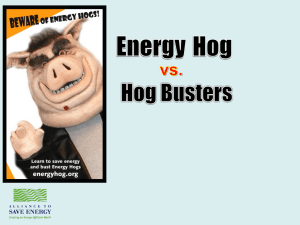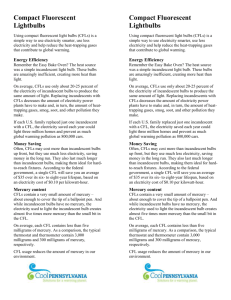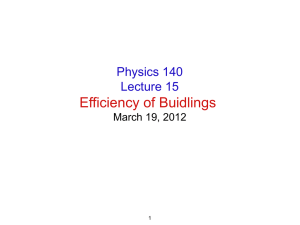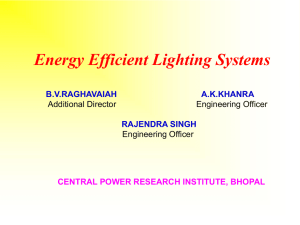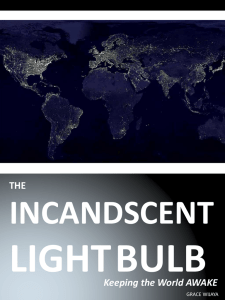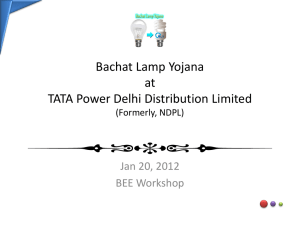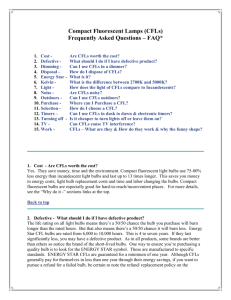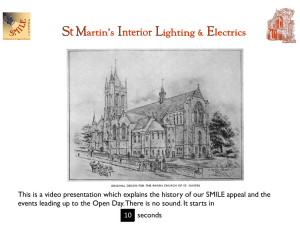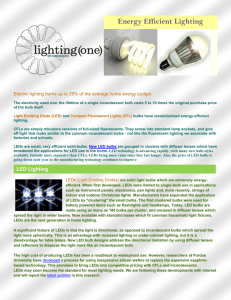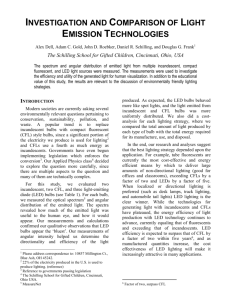Energy Efficiency of Lighting
advertisement
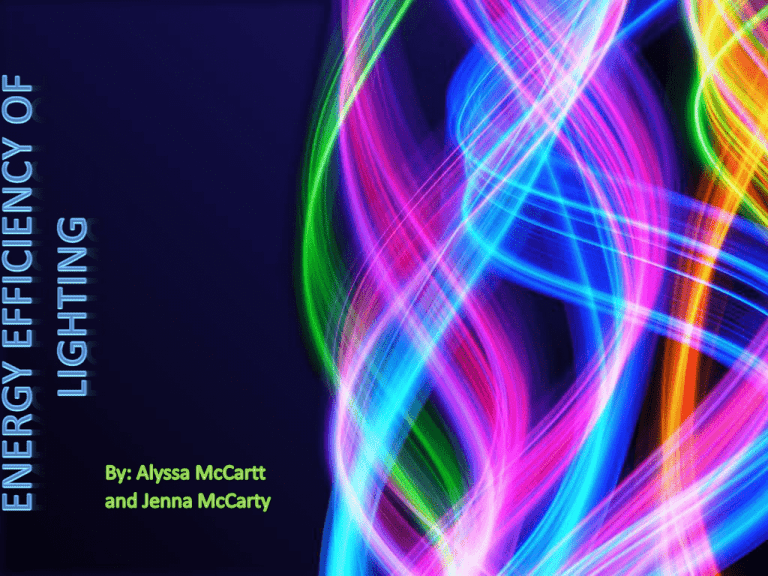
Main Goal of Efficient Lighting • • The main goal of efficient lighting is to help cut lighting operational costs 30% to 60% while enhancing lighting quality, reducing environmental impacts, and promoting health and work productivity. Fluorescent lamps, low-mercury fluorescent lamps, high-intensity discharge lamps, incandescent lamps, LED lamps, fluorescent ballasts, electronic highintensity discharge ballasts, and luminaries are all different sources of energy-efficient lighting. http://www.tradingpost.com.au/is-bin/intershop.static/WFS/SensisSite/SensisTradingPost/en_AU/DigitalOperations/DepartmentPages/Green/Articl es/lighting_hero.jpg Making a Difference in the World • An example of how energy efficient lighting impacts the world: By using a new energy efficient light fixtures called, The Illuminator from Orion Energy Systems of Plymouth, Wisconsin, Cabela's, of Prairie du Chien, a world leader in hunting, fishing, and outdoor gear, will save over 4.05 million kilowatt hours (kWh) per year. Along with that, Cabela's will reduce demand by over a 1/2 Megawatt. Carbon dioxide, which is linked to global warming, will be reduced by 3,038 tons; Carbon reduction by 828 tons, sulfur dioxide, which is related to acid rain, by 11 tons; and nitrogen oxide, which has an effect on acid rain and smog, by 26 tons per year; and a Mercury reduction of .47 pounds Incandescent, Compact Fluorescent, and LED http://www.traderscity.com/board/userpix21/18152-ledpar38-flood-light-bulb-4-watts-50k-daylight-white-1.jpg http://wholeenchilada.files.wordpress.co m/2008/01/bulbxx.jpg http://www.lightbulbmarket.com/files/1974975/uploaded/ Philips%20Mini-Deco%20Twister%20Lamp.gif Fluorescent Light Bulbs • Replace 100 watt standard incandescent • Savings of 75% per bulb • Paying 12 cents per kwh for lighting and you replaced 6 100 watt incandescent bulbs with 6 fluorescent bulbs, savings of $554 per year • Power rate of 12 cents per kwh http://savepower.co.za/tips/wpcontent/uploads/2008/02/incandescent_vs_c fl-energy-saver-globes.jpg Natural Lighting • • • • Locate windows with daylighting in mind Low-E glazing Seasonal window shading Tubular skylights http://www.paramountroofing.net/images/den_fixed_skylight.jpg http://www.archdelight.com/index_files/skylights.jpg Fiber Optics http://hackedgadgets.com/wp-content/_Hybrid_Solar_Lighting_2.jpg http://www.cai-tech.com/Sunlight/Images/tracker4.jpg Technological Obstacles Energy prices Current tax policies Utilities’ profits up for electricity or natural gas, and down by encouraging efficiency. The decision about whether to invest in energy efficiency is often made by someone other than the person paying the energy bill. http://www.istockphoto.com/file_thumbview_approve/5811024/2/isto ckphoto_5811024-cfl-fluorescent-and-incandescent-light-bulbs.jpg Political/Economic Obstacles • Energy-saving light bulbs are so dangerous that everyone must leave the room for at least 15 minutes if one falls to the floor and breaks • Energy efficient bulbs are more expensive • LED’s has a very direct field of light http://www.nature.com/scitable/content/ne0000/ne0000 ne0000/ne0000/5490362/CFL-ill-V4.jpg Benefits of LED Light Bulbs • Long-lasting - LED bulbs last up to 10 times as long as compact fluorescents, and far longer than typical incandescents. • Durable - since LEDs do not have a filament, they are not damaged under circumstances when a regular incandescent bulb would be broken. Because they are solid, LED bulbs hold up well to jarring and bumping. • Cool - these bulbs do not cause heat build-up; LEDs produce 3.4 btu's/hour, compared to 85 for incandescent bulbs. This also cuts down on air conditioning costs in the home. • Mercury-free - no mercury is used in the manufacturing of LEDs. • More efficient - LED light bulbs use only 2-10 watts of electricity (1/3rd to 1/30th of Incandescent or CFL) Small LED flashlight bulbs will extend battery life 10 to 15 times longer than with incandescent bulbs. Also, because these bulbs last for years, energy is saved in maintenance and replacement costs. For example, many cities in the US are replacing their incandescent traffic lights with LED arrays because the electricity costs can be reduced by 80% or more. Benefits of LEDs Contd. • Cost-effective - although LEDs are expensive, the cost is recouped over time and in battery savings. For the AC bulbs and large cluster arrays, the best value comes from commercial use where maintenance and replacement costs are expensive. • Light for remote areas - because of the low power requirement for LEDs, using solar panels becomes more practical and less expensive than running an electric line or using a generator for lighting. http://www.dgtexs.com/images/LED%20Light%20Bulbs.jpg Benefits of CFL Light Bulbs • • • • • Efficient: CFLs are four times more efficient and last up to 10 times longer than incandescents. A 22 watt CFL has about the same light output as a 100 watt incandescent. CFLs use 50 - 80% less energy than incandescents. Less Expensive: Although initially more expensive, you save money in the long run because CFLs use 1/3 the electricity and last up to 10 times as long as incandescents. A single 18 watt CFL used in place of a 75 watt incandescent will save about 570 kWh over its lifetime. At 8 cents per kWh, that equates to a $45 savings. Reduces Air and Water Pollution: Replacing a single incandescent bulb with a CFL will keep a half-ton of CO2 out of the atmosphere over the life of the bulb. If everyone in the U.S. used energy-efficient lighting, we could retire 90 average size power plants. Saving electricity reduces CO2 emissions, sulfur oxide and high-level nuclear waste. High-Quality Light: Newer CFLs give a warm, inviting light instead of the "cool white" light of older fluorescents. They use rare earth phosphors for excellent color and warmth. New electronically ballasted CFLs don't flicker or hum. Versatile: CFLs can be applied nearly anywhere that incandescent lights are used. Energy-efficient CFLs can be used in recessed fixtures, table lamps, track lighting, ceiling fixtures and porch lights. 3-way CFLs are also now available for lamps with 3-way settings. Dimmable CFLs are also available for lights using a dimmer switch. Limitations of CFL Light Bulbs • • • • • • On/Off cycling: CFLs are sensitive to frequent on/off cycling. Their rated lifetimes of 10,000 hours are reduced in applications where the light is switched on and off very often. Closets and other places where lights are needed for brief illumination should use incandescent or LED bulbs. Dimmers: Dimmable CFLs are available for lights using a dimmer switch, but check the package; not all CFLs can be used on dimmer switches. Using a regular CFL with a dimmer can shorten the bulb life span. Timers: Most CFLs can be used with a timer, however some timers have parts which are incompatible with CFLs; to check your timer, consult the timer package or manufacturer. Using an incompatible timer can shorten the life of a CFL bulb. Outdoors: CFLs can be used outdoors, but should be covered or shaded from the elements. Low temperatures may reduce light levels - check the package label to see if the bulb is suited for outdoor use. Retail lighting: CFLs are not spot lights. Retail store display lighting usually requires narrow focus beams for stronger spot lighting. CFLs are better for area lighting. Mercury content: CFLs contain small amounts of mercury which is a toxic metal. This metal may be released if the bulb is broken, or during disposal. New 'Alto' CFL bulbs are now available with low-mercury content. Negative Impacts • Fluorescent lamps contain small amounts of mercury as vapor inside the glass tubing • We don’t really know how to safely recycle CFLs • Negative health effects of CFLs on people who suffer from eye disorders, migraines, and epilepsy http://www.helplightnj.com/wp-content/uploads/2009/12/RecycleCFLs-Banner.jpg http://www.gsi.ir/Images/MedicalGeology/mercury.jpg Bibliography • • • • • • • • http://www.pathnet.org/sp.asp?id=16591 http://www.productdose.com/article.php?article_id=1142 http://www.sunlight-direct.com/news.php http://www.dailymail.co.uk/sciencetech/article-506347/Anenergy-saving-bulb-gone--evacuate-room-now.html http://www.associatedcontent.com/article/1680059/are_energy_ efficient_light_bulbs_good_pg2.html?cat=57 http://www.wbdg.org/resources/efficientlighting.php http://www.energyvortex.com/pages/headlinedetails.cfm?id=70 8&archive=1 http://www.eartheasy.com/live_energyeff_lighting.htm
